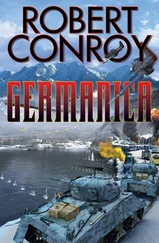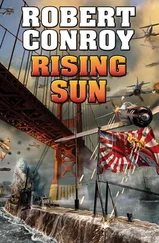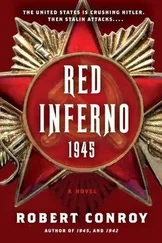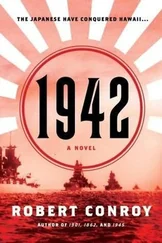Robert Conroy - North Reich
Здесь есть возможность читать онлайн «Robert Conroy - North Reich» весь текст электронной книги совершенно бесплатно (целиком полную версию без сокращений). В некоторых случаях можно слушать аудио, скачать через торрент в формате fb2 и присутствует краткое содержание. Год выпуска: 2012, Жанр: Альтернативная история, на английском языке. Описание произведения, (предисловие) а так же отзывы посетителей доступны на портале библиотеки ЛибКат.
- Название:North Reich
- Автор:
- Жанр:
- Год:2012
- ISBN:нет данных
- Рейтинг книги:4 / 5. Голосов: 1
-
Избранное:Добавить в избранное
- Отзывы:
-
Ваша оценка:
- 80
- 1
- 2
- 3
- 4
- 5
North Reich: краткое содержание, описание и аннотация
Предлагаем к чтению аннотацию, описание, краткое содержание или предисловие (зависит от того, что написал сам автор книги «North Reich»). Если вы не нашли необходимую информацию о книге — напишите в комментариях, мы постараемся отыскать её.
North Reich — читать онлайн бесплатно полную книгу (весь текст) целиком
Ниже представлен текст книги, разбитый по страницам. Система сохранения места последней прочитанной страницы, позволяет с удобством читать онлайн бесплатно книгу «North Reich», без необходимости каждый раз заново искать на чём Вы остановились. Поставьте закладку, и сможете в любой момент перейти на страницу, на которой закончили чтение.
Интервал:
Закладка:

Robert Conroy
North Reich
Prologue
Adolf Hitler laughed sardonically as he read the latest communication from the Japanese Prime Minister, Hideki Tojo. It had been sent to Germany's Foreign Minister Joachim von Ribbentrop and forwarded to him. Several other high ranking Nazis gathered around Hitler in his mountaintop retreat, the Berchtesgaden, and joined in the merriment. Hitler laid the letter on a table and stepped out through the glass door and into the cold. The view of the surrounding snow-covered mountains was breathtaking, especially since Hitler was now at the top of the world he surveyed.
With unintended irony, the Japanese letter was dated December 7, 1943, precisely two years after Japan's overwhelmingly victorious attack on the United States fleet at Pearl Harbor. It was now evident that the nation of little yellow-skinned and racially inferior people was in serious trouble. Hitler and all good Nazis despised Japan. Their current “alliance” was merely a marriage of convenience.
Japan’s problems proved the wisdom of Hitler's refusal to declare war on the United States two years earlier. The mutual defense pact pledged Germany to come to the aid of Japan if she was attacked, but did not require Germany to do anything if Japan was the aggressor, which was clearly the case on December 7, 1941. Ironically, a change in the treaty that would have required Germany’s participation had been drafted, but not yet signed when the Japanese attacked Pearl Harbor
Thus, Germany had stood back and declined to declare war. The Japanese had stiffly contended that they needed no man's help to defeat the U.S., especially white men, and at first it seemed like they were right as they racked up victory after victory in the Pacific. But without having to fight Germany, the U.S. was able to totally focus her immense material resources on Japan, a nation that Hitler considered a third rate power at best. The once mighty Japanese fleet was being destroyed by America’s overwhelming naval power and the Japanese army was being isolated, bypassed and rendered impotent. Bombs were falling on Japanese cities causing immense fires and great loss of life.
Hitler gestured for Field Marshal Wilhelm Keitel and Heinrich Himmler to step outside with him. It amused him to see their reaction to the cold. Keitel, as head of the OKW, was commander of Germany’s armed forces, while Himmler headed up the SS and the Gestapo.
He glared at the two men who were shivering. “Japan wants direct help fighting the United States. How can we do that without involving ourselves in another war?”
Keitel stiffened and blinked as he always did when he had bad news for his Fuhrer. “I don’t believe we can,” he said and Himmler nodded agreement.
Hitler concurred, but didn’t say so. Instead, he almost spat out a response. “The Japanese thought they were better than Aryans and are now begging for help from us. They have been defeated in the Solomon Islands, and our intelligence says that the Americans will soon be attempting to liberate the Philippines. I am tempted to ignore this letter and leave them to their fate.”
Hitler and his coterie had contempt for the American fighting man and the Wall Street Jews who controlled him. This opinion was reinforced by the enormous amount of time that it was taking the United States to defeat what they felt was a third rate Asian horde.
“The American soldier is nothing,” Keitel said. “It will be America's superior industrial power that will overwhelm the Japanese, not the American soldier. With few exceptions, Japanese weaponry is inferior to America’s and cannot be produced in any real quantity. Without German help, my Fuhrer, Japan is doomed.”
Himmler also concurred but added, “However, the sooner we take on the U.S., the sooner we defeat them and then eliminate the Jewish presence in North America. Let the U.S. fight a two front war before Japan collapses and we will win.” Was it finally time to act on Japan’s behalf and in such a manner that it would benefit Germany, Hitler mused. As a result of Germany's not declaring war on the United States, American assistance to England and Russia had dried up. Russia had been defeated and Great Britain, confronted with mass starvation, was forced to ask for a truce that resulted in a strong German presence in Canada. Despite half-hearted protests from the United States about violations of the Monroe Doctrine, Germany had quickly occupied key places in Ontario and Nova Scotia. What perplexed and stymied the U.S. was that Great Britain had agreed to the German occupation in order to let food convoys continue to the British Isles. Since it was Britain’s will, it was difficult to argue or take action against.
Winston Churchill had resigned in disgrace and fled to the U.S. where he'd been granted asylum. Unfortunately for Hitler's plans, many of the Royal Navy's remaining ships had also fled to the United States where they and their crews were interned. Hitler wanted control over that fleet, but would accept its neutrality.
Nazi Germany also maintained an extremely strong force in a shattered and fragmented Russia which had been pushed almost to the Urals. In Hitler’s opinion, Stalin’s Soviet Union was a pathetic rump state that a spring offensive commanded by Field Marshal von Paulus would utterly destroy. Hitler was well aware that other of his generals, primarily Heinz Guderian, disagreed with him. Guderian felt that the Red Army was capable of resurrecting itself. Nonsense, Hitler thought.
In another year at the most, Hitler thought that Japan would collapse and sue for peace, leaving the U.S. free to focus on Germany’s unwelcome presence in Canada. A state of near war already existed between Germany and the U.S., as it had since 1940. Both countries had withdrawn their ambassadors, a sure sign of pending belligerency. Shots had been fired between American and German warships, and an American destroyer had been sunk by a U-boat. There was fighting, but no war.
Hitler pounded his fist into the palm of his other hand. “At some point, the United States and Germany must fight each other. Would now be the time, with America so focused on the Pacific? Coming to Japan's aid would make Tokyo eternally grateful — or as eternally grateful as the treacherous yellow bastards could be. And yes, it would also make the U.S. fight a two-front war which would put them at a great disadvantage. Catching the U.S. with its focus on Japan would give us the opportunity to defeat her by quickly destroying her ability to make war.”
The plan to cripple the Americans had been drawn up in great detail and worked on for a year. Hitler had ignored those, like Guderian, who said it would never work.
Hitler laughed. “Even before getting this whiny letter from Prime Minister Tojo, steps to implement war with the United States have been taken and military assets put into place. It will be a simple matter to further strengthen those forces and fine tune the plans.”
Keitel nodded docile agreement. Hitler knew that many considered the general a spineless toady. Hitler thought he was invaluable.
“With the combined U.S. and British fleets potentially at her disposal, America rules the seas,” Keitel said. “But she does not rule the waters beneath them — the U-boat fleet does, and the U-boat is the weapon of the future, not the aircraft carrier, and certainly not the battleship.”
“Nor does the U.S. even remotely control the enormously long border between herself and Canada,” Himmler added as a spray of windblown snow hit his cheek, causing him to wince. “There is continuous cross-border traffic that the Americans seem unwilling or unable to halt. When the time comes, we will take advantage of that lapse.”
Читать дальшеИнтервал:
Закладка:
Похожие книги на «North Reich»
Представляем Вашему вниманию похожие книги на «North Reich» списком для выбора. Мы отобрали схожую по названию и смыслу литературу в надежде предоставить читателям больше вариантов отыскать новые, интересные, ещё непрочитанные произведения.
Обсуждение, отзывы о книге «North Reich» и просто собственные мнения читателей. Оставьте ваши комментарии, напишите, что Вы думаете о произведении, его смысле или главных героях. Укажите что конкретно понравилось, а что нет, и почему Вы так считаете.












